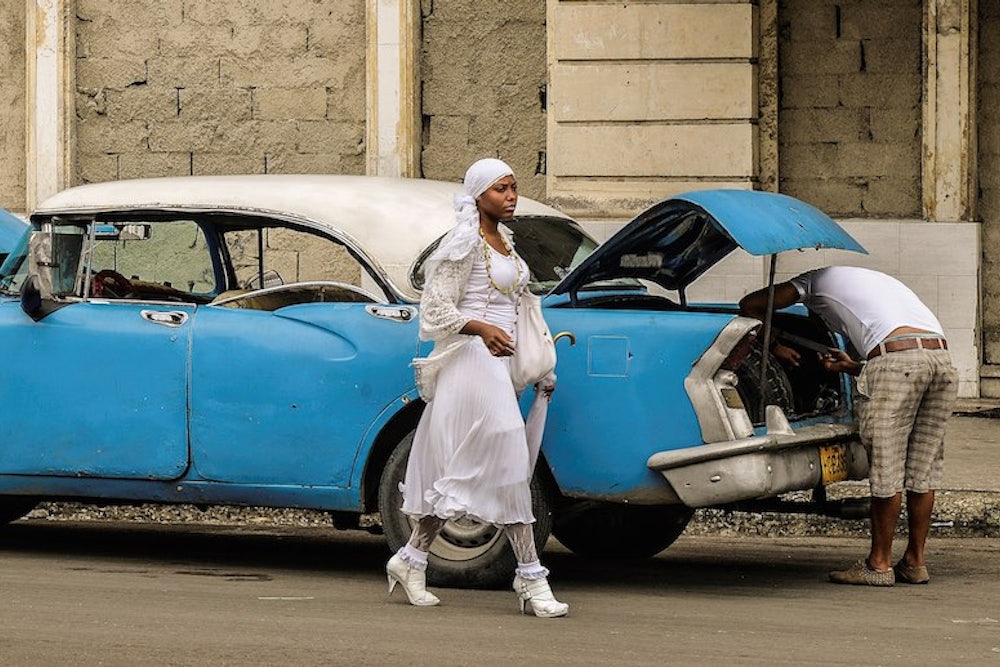President Barack Obama on Wednesday announced that the U.S. is loosening travel and economic restrictions on Cuba and that the two nations would begin talks on reestablishing full diplomatic relations. These “more liberal travel restrictions won’t allow for tourism,” CNN reports, but that hasn’t stopped Americans from proclaiming on Twitter—and in The New Republic’s D.C. office—that they’re booking the first flight to the island, to see it before American tourists and investment change it irrevocably.
Don’t be one of these people.
Honorable mention for dumb Cuba commentary: Lefties bemoaning how western capitalist influence will spoil Cuba. https://t.co/uJOpDl7x4Y
— Josh Barro (@jbarro) December 17, 2014
When Americans daydream about visiting Cuba before it’s “spoiled,” they’re implying that the island today is some kind of paradise. I have been there. It is not a paradise. The buildings in Havana are literally crumbling, many of them held upright by two-by-fours. Even the cleanest bathrooms are fetid, as if the country’s infrastructural bowels might collectively evacuate at any minute. And the streets are riddled with potholes, some large enough to swallow a Russian Lada. The country isn’t so much frozen in time as in a state of perpetual rot, which is exactly what the 1961 embargo was designed to do.
But the cars! Yes, let’s talk about those cars. Cubans don’t drive American antiques because they love American antiques as much as we do, but because they have no choice. Until a few years ago, as NPR has reported, “The only cars that could be freely bought and sold were those built before 1959, when Fidel Castro came to power. That’s why there are still nearly 60,000 classic cars on Cuba’s streets.” (There are also some 100,000 Ladas on the streets, but their sale was restricted.) This is also why every car owner in Cuba is a mechanic—not because they have some burning desire to fix broken axles, but out of necessity. Few Cubans can afford to buy a new car at American prices, let alone at Havana’s 400 percent markup. So if you don’t fix your car, you won’t have a functioning car.
By some metrics, Cuba has the lowest income inequality in the world, which, in addition to nearly universal education and healthcare, have helped the country crack the top 50 of the U.N.’s Human Development Index. But the average monthly wage is $20—that is, Cubans are equal in their poverty. And when it comes to socialism, numbers and indices can only tell so much anyway. The anti-poverty Borgen Project has a very simple, but accurate description of the everyday conditions in Cuba:
Poverty in Cuba is severe in terms of access to physical commodities, especially in rural areas. Farmers struggle and many women depend on prostitution to make a living. Citizens have few material possessions and lead simpler lives with few luxuries and far more limited political freedom.
Cubans are an opportunistic people because theirs is a land with so little opportunity. That’s why prostitution, though illegal and strictly punished, is nonetheless rampant there. If you visit Cuba to puff cigars, get drunk on rum-and-cokes or mojitos, read Hemingway, and fetishize the country’s dilapidation with your brand-new Canon Rebel, you just might miss this uglier side. In my six weeks there, I saw few street-walkers—but not a single night of dancing went by without one woman, and often more than one, whispering an offer into my ear.
That’s paradise for a certain kind of tourist, I suppose. But it sure looked like hell to me.
